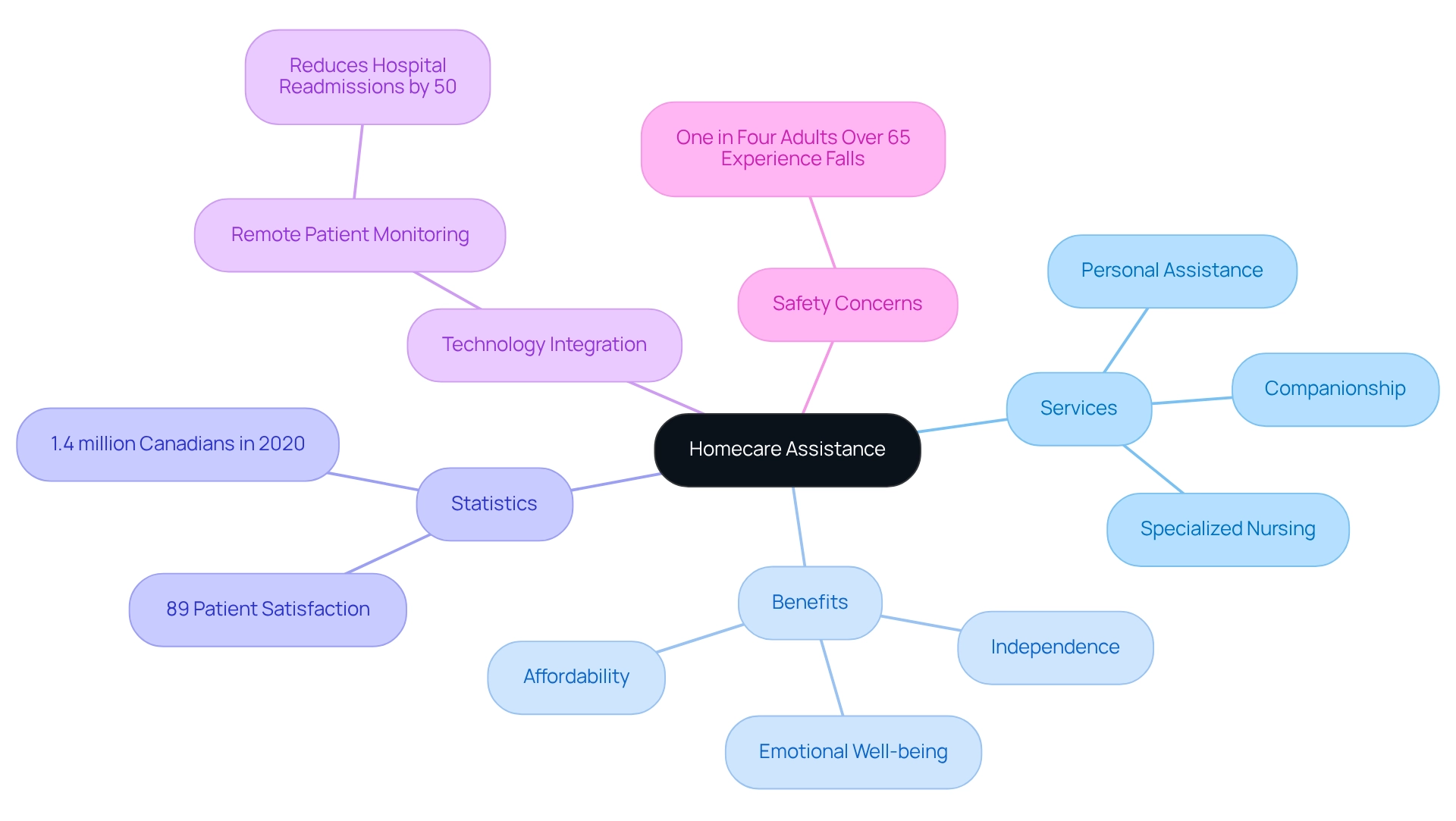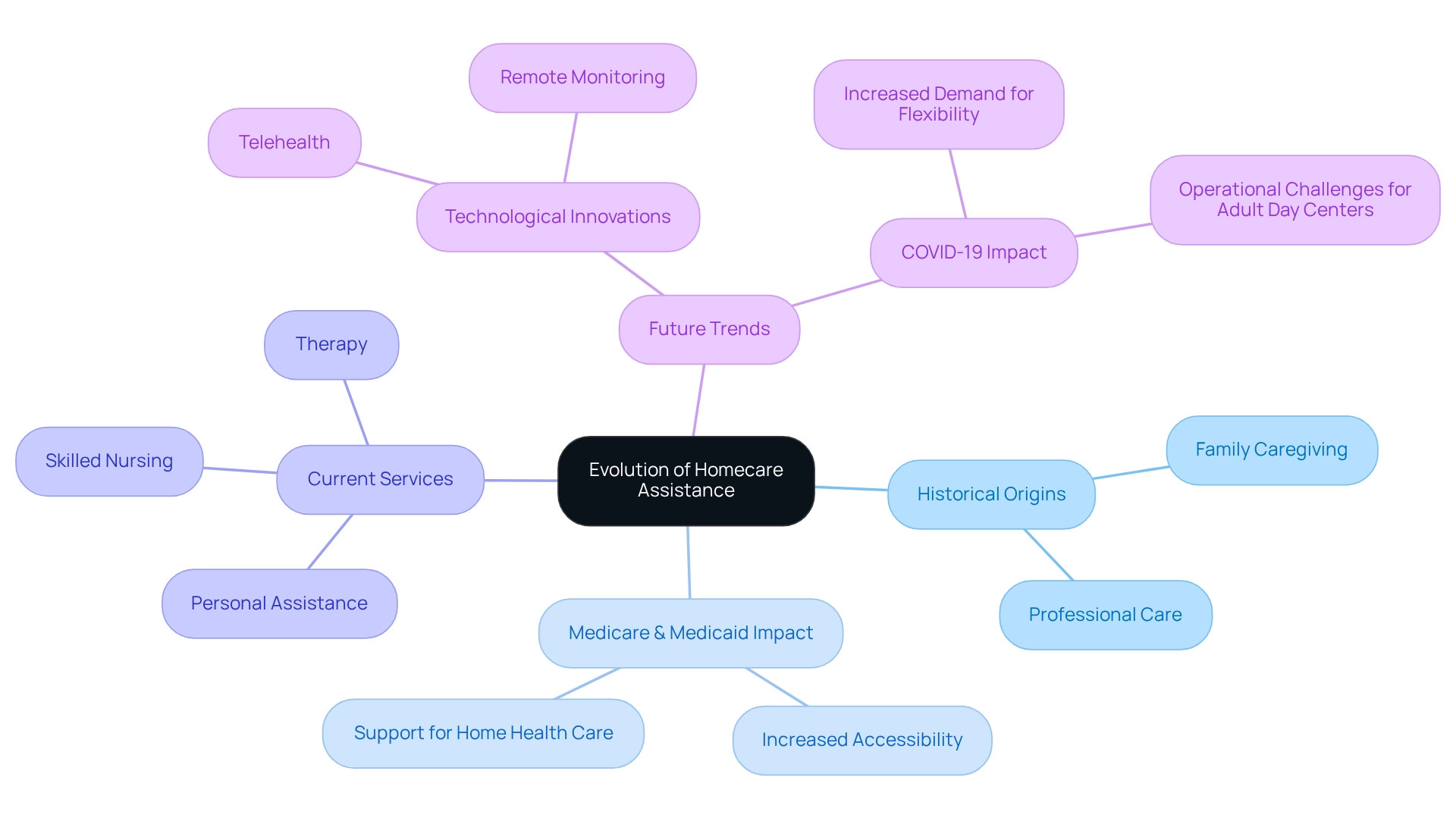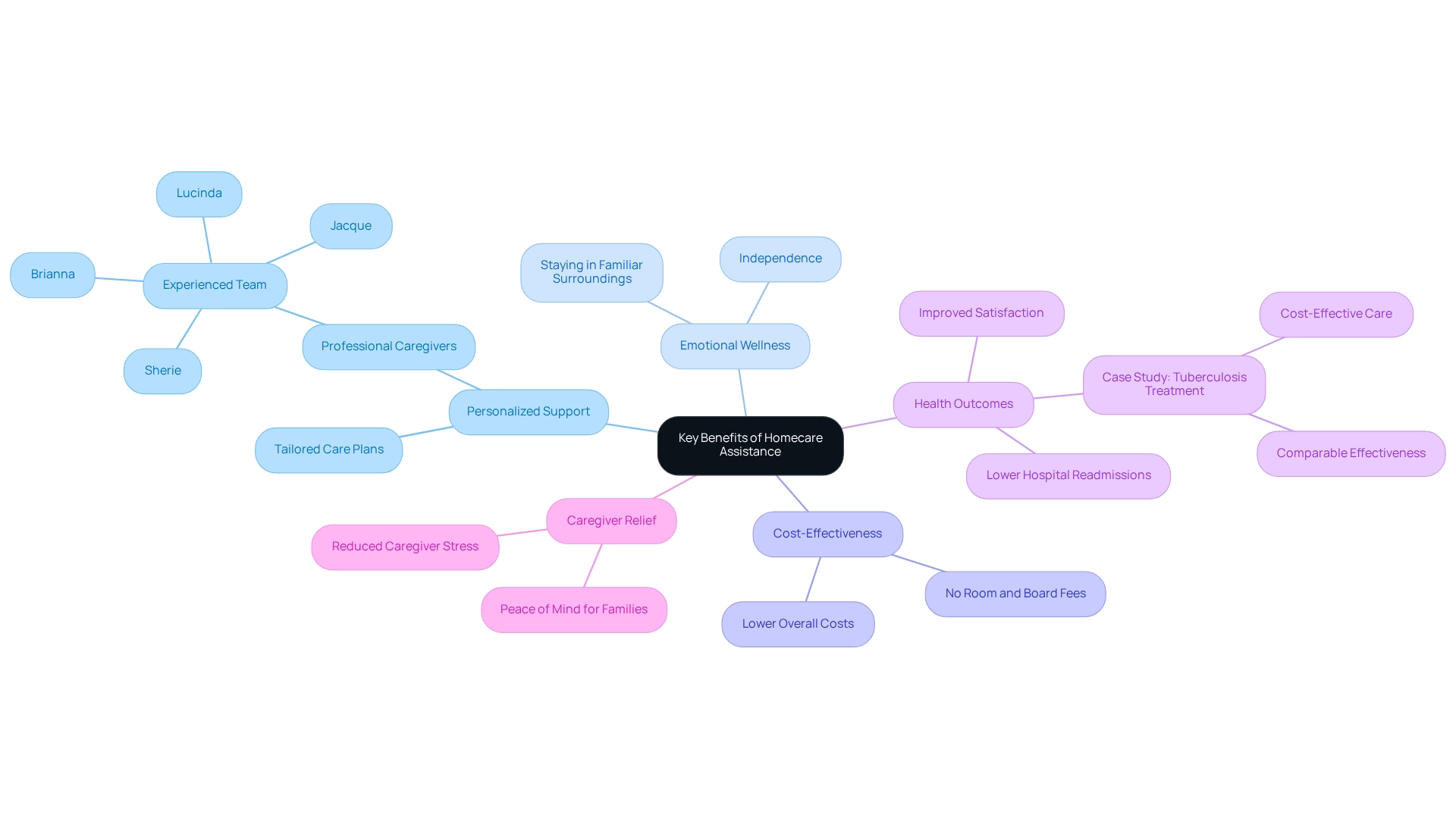Overview
Homecare assistance offers essential supportive services that empower individuals, especially seniors, to maintain their independence and enhance their quality of life in the comfort of their own homes. These services, including personal care, companionship, and skilled nursing, are not only more affordable and convenient than institutional care but also lead to better health outcomes and higher satisfaction among patients.
In addition, many families find that homecare assistance allows their loved ones to thrive in an environment they cherish. Imagine the peace of mind that comes from knowing your parent or grandparent is receiving compassionate care tailored to their unique needs.
Furthermore, the nurturing nature of these services fosters a sense of belonging and connection, making it easier for seniors to engage with their communities. We understand that this journey can be overwhelming, but remember, you are not alone.
As a result, we encourage you to explore how homecare assistance can make a significant difference in the lives of your loved ones. Your comfort is our priority, and we’re here for you every step of the way.
Introduction
In a world where the desire for independence and comfort often meets the challenges of aging and chronic illness, homecare assistance stands out as a vital solution. This comprehensive support system provides a variety of services—from personal care to skilled nursing—aimed at enhancing the quality of life for individuals, especially seniors. Unlike traditional institutional care, homecare allows individuals to receive necessary assistance in the familiar surroundings of their own homes, nurturing emotional well-being and security.
As the demand for these services continues to grow, driven by an aging population and advancements in technology, understanding the benefits and components of homecare assistance becomes essential. Families seeking reliable support for their loved ones can find reassurance in knowing that help is available. We’re here for you, and your comfort is our priority.
Defining Homecare Assistance: An Overview
Homecare assistance includes a range of supportive services aimed at helping individuals, especially seniors and those with chronic conditions, to maintain their independence and improve their quality of life. These services include:
- Personal assistance
- Companionship
- Specialized nursing
All tailored to meet the unique needs of each individual. Unlike institutional support, homecare assistance allows people to receive help in the comfort of their own homes, fostering emotional well-being and a sense of security. Best Care Nurses Registry emphasizes that home health services are not only more affordable but also more convenient and equally effective compared to care provided in hospitals or nursing facilities.
The flexibility of homecare assistance is a significant advantage, offering options that range from a few hours each week to comprehensive round-the-clock care, depending on the specific needs of the individual. Since 1980, Best Care has been connecting families with nurses who provide personalized assistance, ensuring that seniors receive the attention they deserve while allowing families to focus on their own responsibilities. Importantly, there are no minimum hours required for support, and assistance with long-term care insurance claims is readily available.
In 2020, approximately 1.4 million Canadians benefited from home care, highlighting the growing reliance on these essential services. Additionally, a 2022 survey revealed that 89% of patients expressed satisfaction with at-home healthcare services, underscoring the positive impact of personalized care.
The integration of advanced technologies, such as remote patient monitoring (RPM), has further enhanced home assistance. Research indicates that RPM can reduce hospital readmissions by 50% for individuals with chronic conditions, demonstrating the power of technology in improving patient outcomes and reducing healthcare costs. Overall, homecare assistance is vital for preserving the autonomy of seniors, enabling them to live in familiar surroundings while receiving the necessary support. This approach not only alleviates the emotional strain on families but also ensures that loved ones receive high-quality care tailored to their needs.
As noted by Best Care Nurses Registry, one in four adults over the age of 65 experiences a fall each year, highlighting the critical role of caregiving support in preventing such incidents and ensuring safety.

The Context and Evolution of Homecare Assistance
Homecare assistance has evolved significantly from its traditional caregiving origins, where family members served as the primary providers of care. As our loved ones grow older and healthcare needs become more intricate, the demand for homecare assistance has surged. The launch of Medicare and Medicaid in the 1960s marked a crucial time, as these programs began to include home health care, improving accessibility for millions.
Today, the at-home support environment offers a variety of options, such as personal assistance, skilled nursing, and therapy. This illustrates a wider acknowledgment of the importance of aging in place, allowing individuals to maintain their independence and quality of life in familiar surroundings. With the U.S. home healthcare sector expected to surpass $300 billion, the growth of at-home services is set to continue, driven by technological innovations and a greater focus on individualized support. Furthermore, the COVID-19 pandemic has highlighted the necessity for flexible and responsive homecare assistance solutions, as many adult day centers faced closures or operational limitations. As recovery advances, the incorporation of digital tools such as telehealth and remote monitoring is anticipated to enhance patient safety and autonomy, meeting the increasing need for customized support solutions.
We understand that navigating these changes can be challenging, but rest assured, we are here for you. Your comfort and well-being are our priority, and we are committed to providing the support you need to thrive at home.

Key Benefits of Homecare Assistance for Individuals and Families
Homecare assistance provides a wealth of advantages, particularly through personalized support that caters to unique needs, significantly enhancing the quality of life for recipients. By allowing individuals to remain in their cherished surroundings, homecare assistance nurtures emotional wellness and fosters independence. For families, the support of professional caregivers eases the overwhelming burden of caregiving, providing peace of mind that their loved ones are in capable hands.
Moreover, homecare assistance is often more affordable than facility-based care. It eliminates the extra costs associated with room and board in facilities, making it a financially viable option for many families. Studies indicate that individuals receiving homecare assistance frequently enjoy improved health outcomes, including lower rates of hospital readmissions and greater overall satisfaction with their care. A notable case study on tuberculosis treatment revealed that at-home care was not only less costly than hospital care but also maintained comparable effectiveness, underscoring the potential of at-home care in managing various health conditions.
Statistics further reinforce the benefits of homecare assistance, indicating that families utilizing this support report significant reductions in caregiver stress and enhanced health outcomes for their loved ones. One family shared, “The caregivers from Best Care made a world of difference for my mother. Their compassion and professionalism gave us peace of mind during a challenging time.” This blend of personalized support and cost-effectiveness positions Best Care Nurses Registry as a preferred choice for families seeking trustworthy homecare assistance for their loved ones. With a dedicated team that includes experienced professionals like Brianna, Lucinda, Sherie, and Jacque, Best Care ensures that each client receives tailored support. Sherie, for example, plays a vital role as a matchmaker between clients and caregivers, guaranteeing that everyone receives the appropriate support customized to their needs.

Components of Homecare Assistance: Services Offered
Homecare assistance includes a wide range of support designed to address the specific needs of individuals. It is essential to recognize the importance of compassionate care in enhancing the quality of life for those we serve.
-
Personal Care: Support with activities of daily living (ADLs) such as bathing, dressing, grooming, and toileting is vital for maintaining dignity and independence. We understand how crucial these aspects are for your loved ones.
-
Companionship: Social interaction and emotional support play a significant role in alleviating loneliness and isolation among seniors. Research indicates that companionship can significantly reduce feelings of loneliness, enhancing overall well-being. Engaging partners also encourage physical activity, helping to sustain mobility and promote general health.
-
Skilled Nursing: Our registered nurses (RNs) and licensed practical nurses (LPNs) provide essential services such as medication management, wound care, and health monitoring. These professionals ensure that medical needs are met with expertise while also offering valuable patient education and emotional support.
-
Therapy Options: Physical, occupational, and speech therapy are critical for recovery and rehabilitation, assisting individuals in regaining their independence and improving their quality of life.
-
Homemaking Assistance: Light housekeeping, meal preparation, and laundry services create a clean and safe living environment, allowing clients to focus on their health and well-being.
These services can be customized to fit individual needs, ensuring that care is both effective and compassionate. Since 1980, Best Care Nurses Registry has been dedicated to providing flexible and nurturing homecare assistance services, enabling seniors to live safely and happily in their own homes. Remember, we’re here for you, and your comfort is our priority.
Conclusion
Homecare assistance serves as a crucial lifeline for individuals, particularly seniors and those with chronic illnesses, by offering tailored support that enhances their quality of life. With a diverse range of services—including personal care, companionship, skilled nursing, and therapy—homecare allows individuals to maintain their independence in the comfort of their own homes. This personalized approach not only fosters emotional well-being but also alleviates the burdens often faced by family caregivers, making it a preferred choice for many.
The evolution of homecare services reflects a growing recognition of the need for effective, flexible, and compassionate care solutions. As the demand for these services continues to rise, driven by an aging population and advancements in technology, homecare is becoming increasingly integral to the healthcare landscape. The positive outcomes reported by families and patients further underscore the effectiveness of homecare, demonstrating that it can lead to better health results and greater satisfaction compared to traditional institutional care.
Ultimately, homecare assistance stands out as a vital solution that prioritizes comfort, safety, and individualized support. By embracing this approach, families can ensure that their loved ones receive the high-quality care they deserve, allowing them to thrive in the familiar surroundings of their own homes. As the sector continues to grow and adapt, the promise of homecare assistance remains an essential consideration for anyone seeking to enhance the quality of life for themselves or their loved ones.
Frequently Asked Questions
What is homecare assistance?
Homecare assistance includes a range of supportive services designed to help individuals, particularly seniors and those with chronic conditions, maintain their independence and improve their quality of life. Services include personal assistance, companionship, and specialized nursing.
What are the advantages of homecare assistance compared to institutional support?
Homecare assistance allows individuals to receive help in the comfort of their own homes, which fosters emotional well-being and a sense of security. It is also generally more affordable, convenient, and equally effective compared to care provided in hospitals or nursing facilities.
How flexible is homecare assistance?
Homecare assistance offers significant flexibility, with options ranging from a few hours of care each week to comprehensive round-the-clock support, depending on the individual’s specific needs.
Are there any minimum hours required for homecare assistance?
No, there are no minimum hours required for support in homecare assistance.
How has the demand for homecare assistance changed in Canada?
In 2020, approximately 1.4 million Canadians benefited from home care, indicating a growing reliance on these essential services.
What is the satisfaction rate among patients receiving homecare assistance?
A 2022 survey revealed that 89% of patients expressed satisfaction with at-home healthcare services.
How does technology enhance homecare assistance?
The integration of advanced technologies, such as remote patient monitoring (RPM), has improved home assistance by reducing hospital readmissions by 50% for individuals with chronic conditions, thus improving patient outcomes and reducing healthcare costs.
What is the importance of caregiving support for seniors?
Caregiving support is vital for preserving the autonomy of seniors, allowing them to live in familiar surroundings while receiving necessary support. It also helps prevent incidents such as falls, as one in four adults over the age of 65 experiences a fall each year.











